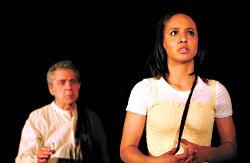If you’re an impetuous young troupe aspiring to do Shakespeare, what better choice than Romeo and Juliet, an impetuous youth’s play about still younger, more impetuous lovers? Balagan Theatre’s production is not half bad—it’s about 51 percent good.
On the 49 percent bad side, nobody is quite up to elocuting the poetry properly. The actors just have trouble wrapping their mouths around all those complicated rhythmic syllables. When the doomed lovers first meet, and experienced Shakespearean actors are playing them, you can tell that their lines of dialogue form a poem—it’s bigger than the both of them. Here, it’s just two teenagers in love at first sight.
But for modern audiences, it’s more important that the actors capture the coltish emotions: Romeo’s passionate cluelessness, Juliet’s helplessly hot heart (and canny upping of the romantic ante—she steals the second kiss). This Banton Foster and Allison Strickland do. On a snug black set with nothing but a bench for a balcony that doubles as a bier, and the odd blankets and pillows for trysting, they convey the essence of the play.
The whole cast is all about youthful enthusiasm—even Juliet’s dad (Curtis Eastwood) is an overgrown kid whose eyes light up at the thought of a party. You know that noted overactor Ryan Higgins’ Mercutio is going to be lots more mercurial, stomping the stage far louder than any patron of the restaurant upstairs from the Balagan (whose scraping chairs occasionally intrude into the play’s sound design). His boots actually appeared to start to come apart midperformance—it looked like they were held together with tape.
Being noisily out of control works better for Mercutio than most roles, and Higgins threatens to steal the show from dewy-eyed Foster (who’s as gentle as Thomas Maier’s Benvolio). That’s why Shakespeare has to kill him early. The big fight scene is way too long, and Mercutio doesn’t seem bitter to die, just in denial. But the fairly complex physical fracas brings Balagan to a new level technically. Kudos to fight choreographer Kevin Inouye and, in the masque scene, dance choreographer Susan Graf (who also pulls off three small roles).
I wish I’d gotten to see the Balagan debut of Seattle Rep understudy Mark Carr as Tybalt; the flu epidemic that ravaged the cast forced managing director Jake Groshong to take over, though Carr will be back this weekend. Groshong’s stiff, looming physical presence was ideal for a Victorian explorer role in Cloud 9, and he nails Tybalt’s excessive sense of his own and his family’s dignity, but he’s too stolid for a swashbuckling hothead. Richard Clairmont’s Friar Laurence is likewise good as far as it goes: you get his authority, but not his dark side, his unseemly interest in the romance and his cowardice when the plan goes fatally awry. Only Kara Thornes’ Lady Capulet strikes a resonant minor chord. She’s an ice queen siding with tyrannical Capulet against Juliet.
The standout performance is Rebecca M. Davis as Juliet’s Nurse. Talk about unseemly interest in the teens’ romance! This old gal is palpably loving, forever pulling Juliet to her ample bosom for comfort, but practically a pimp, gabbing about how horny Juliet was as a toddler, and advising her to marry dull, rich Paris (Sam Hagen) and mess around with Romeo on the sly. Davis’ role is close to the core of the concept of co-directors Lisa Confehr and Kaitie Warren: big, sloppy, drawn with bold crayon strokes in primary colors.
Balagan seems to be on an upswing. The sound system, once an audience torture device, is now crackle-free, though still idiotically turned up so loud it drowns out the dialogue. (Maybe this is to drown out the upstairs restaurant noise, but that’s no worse than the subway rumbles you hear at New York’s Public Theater—it’s not too bad a distraction.) The productions are more ambitiously conceived than most fringe theater, and more accomplished. I’ll bet their next show will be 61 percent good.








